16 locust master-trainers from CA Region will be trained in Dushanbe
Dushanbe, 24.02.2016. (NIAT “Khovar”). — A FAO regional Training-of-Trainers on locust management will be held from 22 February to 4 March 2016 in Dushanbe with the objective to train 16 Master-Trainers from Afghanistan, Kyrgyzstan, Tajikistan and Uzbekistan.
This is part of the FAO Programme to improve national and regional locust management in Caucasus and Central Asia and it is funded by contributions from the Japan International Cooperation Agency (JICA) and the United States Agency for International Development (USAID).
The main goals of this Training-of-Trainers is to update, improve and harmonize knowledge concerning bio-ecology of the locust pests, survey operations and information management; it will also aim at improving spraying techniques as well as mitigating and monitoring potential impact of locust control operations on human health and environment. This workshop, which will include field exercises in Hissor district, will allow training a total of 16 Master Trainers from four countries, who will receive tutorial material and will be in turn able to deliver trainings at national level.
“The only sustainable way to deal with transboundary locust pests is the so-called preventive control strategy, based on early warning and early reaction, together with a solid regional cooperation between neighboring countries as locusts do not know borders,” — said Mr Viorel Gutu, FAO Representative in Tajikistan.
The overall objective of the FAO Programme to improve national and regional locust management in Caucasus and Central Asia will be to contribute to food security and livelihood of the rural populations in Central Asia by preventing and limiting the threats posed by locusts and damage to crops and rangelands in the respect of human health and the environment. The expected outcome of the project will be that national and regional locust management is improved in Afghanistan, Kyrgyzstan and Tajikistan and in their neighboring countries, through development of increased national capacities and regional cooperation.











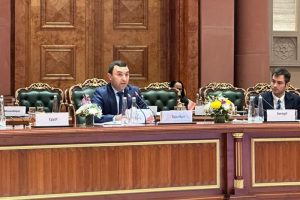 Tajikistan Promotes Digital Transformation Agenda at AI Impact Summit
Tajikistan Promotes Digital Transformation Agenda at AI Impact Summit Tajikistan Expands AI Cooperation with Google DeepMind
Tajikistan Expands AI Cooperation with Google DeepMind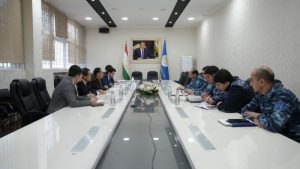 Tajik Customs, Japanese Firm Sign Deal on Cargo Scanning Upgrade Project
Tajik Customs, Japanese Firm Sign Deal on Cargo Scanning Upgrade Project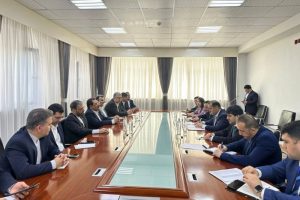 Tajikistan, Iran Discuss Boosting Direct Investment Cooperation
Tajikistan, Iran Discuss Boosting Direct Investment Cooperation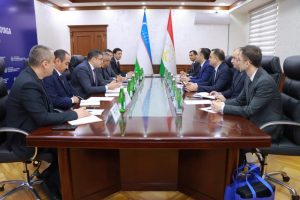 Tajik and Uzbek Anti-Corruption Agencies Discuss Expanding Cooperation
Tajik and Uzbek Anti-Corruption Agencies Discuss Expanding Cooperation Starlink Satellite Internet Launches in Tajikistan
Starlink Satellite Internet Launches in Tajikistan Austrian Company Andritz Hydro Seeks to Expand Cooperation with Tajikistan
Austrian Company Andritz Hydro Seeks to Expand Cooperation with Tajikistan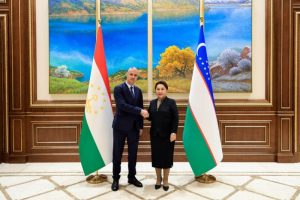 Ambassador of Tajikistan Meets with Chairperson of the Senate of Uzbekistan
Ambassador of Tajikistan Meets with Chairperson of the Senate of Uzbekistan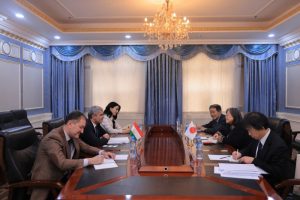 Tajikistan and Japan Discuss Cooperation within Regional and International Organizations
Tajikistan and Japan Discuss Cooperation within Regional and International Organizations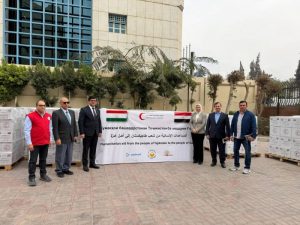 Tajikistan’s Humanitarian Aid to the People of Gaza
Tajikistan’s Humanitarian Aid to the People of Gaza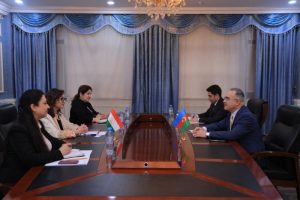 Bilateral Cooperation Between Tajikistan and Azerbaijan Discussed in Dushanbe
Bilateral Cooperation Between Tajikistan and Azerbaijan Discussed in Dushanbe Tajikistan Establishes Data Protection Center to Strengthen Cybersecurity
Tajikistan Establishes Data Protection Center to Strengthen Cybersecurity














